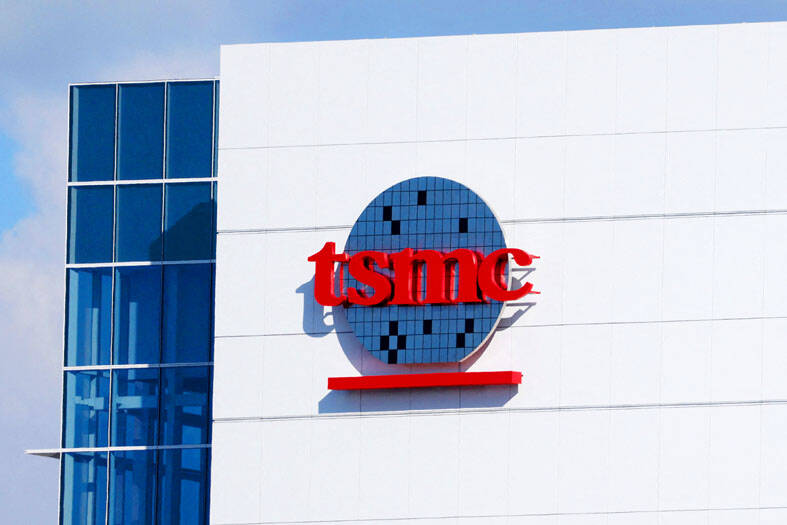US President Donald Trump on Tuesday said that Taiwan Semiconductor Manufacturing Co (TSMC, 台積電) could invest US$300 billion in Arizona, which would be nearly double the total investment TSMC has announced to date in the US.
“We have the biggest [chipmaker] in the world [TSMC] from Taiwan is coming over and spending 300 billion dollars in Arizona building the biggest plant in the world for chips and semiconductors,” Trump said in an interview on CNBC’s financial talk show Squawk Box.
Trump said that new tariffs on semiconductors and chips would be unveiled “within the next week or so” — calling them a “separate category,” because the US wants those products made domestically.

Photo: Ann Wang, Reuters
TSMC, which in March announced it would expand its investment in the US to US$165 billion over several years, declined to respond to media inquiries about Trump’s remarks, saying that any comments would be made through official company statements.
TSMC’s original US$65 billion investment in the US was to build three chip fabrication plants, while the additional US$100 billion investment would be put into three new fabs, two advanced packaging facilities, and a research-and-development center, the company said at the time.
TF International Securities Group Co (天風國際證券) analyst Kuo Ming-chi (郭明錤) cast doubt on Trump’s numbers.
“TSMC’s officially announced investment is US$165 billion, while Trump previously stated US$200 billion. His further escalation to US$300 billion seems to be laying the groundwork for upcoming semiconductor tariffs, consistent with his stated approach of ‘starting with an extremely high number, then negotiating down,’” Kuo wrote on social media.
Regarding rumors that TSMC is being pressured to take a 49 percent stake in Intel Corp or invest an additional US$400 billion in the US as part of Taiwan-US trade negotiations, Kuo said his understanding is that the talks have not involved TSMC.
“If the aforementioned market rumors were true, TSMC would need to invest a total of US$565 billion in the US, far exceeding Trump’s stated US$300 billion, indicating these market rumors are unfounded,” he added.
TSMC shares fell 2.17 percent in Taipei trading after its American depositary receipts dropped 2.73 percent overnight. The contract chipmaker’s decline weighed heavily on the local main board, with the TAIEX closing down 213.23 points, or 0.90 percent, at 23,447.36.
“Trump’s remark renewed fears over tariffs on semiconductors, which are a backbone of Taiwan’s exports,” Concord Securities Co (康和證券) analyst Kerry Huang (黃志祺) said.
“Such tariffs are expected to have a more significant negative impact on Taiwan’s economy than the 20 percent blanket levy on Taiwanese goods announced last week,” Huang added.
The US Department of Commerce in April launched an investigation of the semiconductor market under Section 232 of the Trade Expansion Act of 1962, paving the way for potential tariffs on semiconductors. Such levies threaten to sharply increase costs for large data center operators, including Microsoft Corp, OpenAI, Meta Platforms Inc and Amazon.com Inc, that plan to spend billions of dollars on advanced semiconductors needed to propel their artificial intelligence businesses.

Right-wing political scientist Laura Fernandez on Sunday won Costa Rica’s presidential election by a landslide, after promising to crack down on rising violence linked to the cocaine trade. Fernandez’s nearest rival, economist Alvaro Ramos, conceded defeat as results showed the ruling party far exceeding the threshold of 40 percent needed to avoid a runoff. With 94 percent of polling stations counted, the political heir of outgoing Costa Rican President Rodrigo Chaves had captured 48.3 percent of the vote compared with Ramos’ 33.4 percent, the Supreme Electoral Tribunal said. As soon as the first results were announced, members of Fernandez’s Sovereign People’s Party

MORE RESPONSIBILITY: Draftees would be expected to fight alongside professional soldiers, likely requiring the transformation of some training brigades into combat units The armed forces are to start incorporating new conscripts into combined arms brigades this year to enhance combat readiness, the Executive Yuan’s latest policy report said. The new policy would affect Taiwanese men entering the military for their compulsory service, which was extended to one year under reforms by then-president Tsai Ing-wen (蔡英文) in 2022. The conscripts would be trained to operate machine guns, uncrewed aerial vehicles, anti-tank guided missile launchers and Stinger air defense systems, the report said, adding that the basic training would be lengthened to eight weeks. After basic training, conscripts would be sorted into infantry battalions that would take

GROWING AMBITIONS: The scale and tempo of the operations show that the Strait has become the core theater for China to expand its security interests, the report said Chinese military aircraft incursions around Taiwan have surged nearly 15-fold over the past five years, according to a report released yesterday by the Democratic Progressive Party’s (DPP) Department of China Affairs. Sorties in the Taiwan Strait were previously irregular, totaling 380 in 2020, but have since evolved into routine operations, the report showed. “This demonstrates that the Taiwan Strait has become both the starting point and testing ground for Beijing’s expansionist ambitions,” it said. Driven by military expansionism, China is systematically pursuing actions aimed at altering the regional “status quo,” the department said, adding that Taiwan represents the most critical link in China’s

‘REALLY PROUD’: Nvidia would not be possible without Taiwan, Huang said, adding that TSMC would be increasing its capacity by 100 percent Nvidia Corp CEO Jensen Huang (黃仁勳) on Saturday praised and lightly cajoled his major Taiwanese suppliers to produce more to help power strong demand for artificial intelligence (AI), capping a visit to the country of his birth, where he has been mobbed by adoring fans at every step. Speaking at an impromptu press conference in the rain outside a Taipei restaurant, where he had hosted suppliers for a “trillion-dollar dinner,” named after the market capitalization of those firms attending, Huang said this would be another good year for business. “TSMC needs to work very hard this year because I need a lot